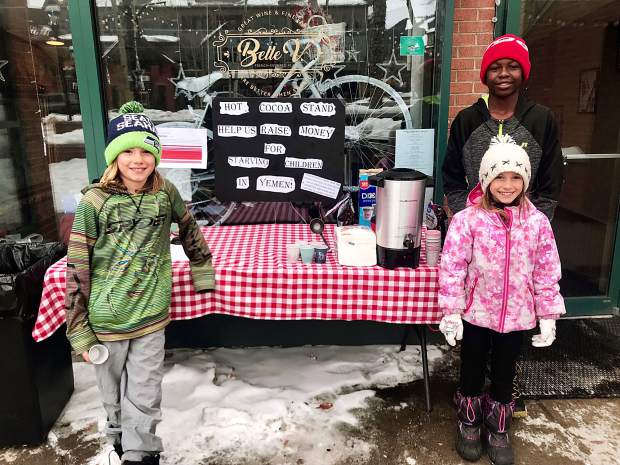SUMMIT DAILY NEWS: When Jaci and Stephan Ohayon ventured to the Dominican Republic last year they were hoping for a change of perspective. The Silverthorne couple saw a chance to remove their children for a time from the Summit County "bubble," and introduce them to an alien world filled with both outstanding beauty and widespread poverty.
But what they found there, or rather who, made more of an impact than they could have ever imagined. On their trip they met a young Haitian boy named Jonas, who in the time since has become an unofficial member of the family. As the second youngest of eight children in an exceptionally impoverished family, Jonas grew up as a "street kid," shining tourists' shoes to feed himself, and taking what little he could back to his mother.
But earlier this year, thanks to the generosity of the Ohayon family, Jonas was given something that had eluded him throughout his early years: a chance at a better life. The Ohayons, with the blessings of Jonas' mother, began working to bring Jonas to the United States, where a spot is currently waiting for him at The Peak School in Frisco. He'd have a chance to educate himself, and after his schooling is over to return to Haiti and help raise his family out of poverty.
But immigration into the United States, especially for a poor boy from a poor country, is an uphill battle. In September — despite a valid passport, along with a bedroom and spot in school waiting — his student visa was denied. But the fight isn't over yet.
"I'm an immigration attorney, and I know how impossible this seems," said Jaci. "But we've got faith, and I was hoping for a miracle. The problem is the U.S. Embassy treats every applicant as an intending immigrant. Jonas' family has nothing. They can't show that they have jobs and a house, things that would show he'd go back. … we just sent money for a new visa application fee, and we're hoping to get another interview by the end of the week. I still know it's not a super great application. We can't show ties to Haiti when there aren't any. But I believe in miracles, and I still think he could get here."
FAMILY VACATION
In April 2017, on an otherwise unremarkable day, the Ohayon family was spending a day at the beach in Las Terrenas, a small town on the northeastern coast of the Dominican Republic. As they sat there they noticed a small boy tossing his flip-flops into the ocean and diving in after them with his clothes on. Curious, they called him over and invited him to have lunch with them. That was their first interaction with Jonas.
Communication was difficult at first. He didn't speak English, and his French and Spanish were still a work in progress. But he made an instant impression on the family.
"He has the brightest, most vibrant smile ever," said Jaci. "He was just amazing. He would just play with Maxim and Eleeana (the Ohayons' children). He was obviously older than them, but he was interested in them. We invited him to have lunch with us, and that's when we found out that he shined shoes for a job. When Maxim realized that Jonas was a kid with a job it really hit him hard. He took the money out of his pocket and tried to give it to Jonas.
"It was just a huge thing for our kids, and we wanted to develop that relationship more," Jaci explained. "We thought they could really learn a lot from each other. So we asked him the next day if he wanted to meet us in the park, and we just started meeting with him throughout the rest of our vacation."
Despite numerous warnings from individuals in the area not to trust "street kids," the Ohayons saw something different in Jonas.
"He was very respectful," said Stephan. "He was obviously hungry, but he would never ask for food. These kids are here to make money from people from developed countries. They try to get as much as possible. But with him, he never asked for anything."
Over the following months they became close with Jonas. They learned that he was originally from a town called Cap-Haitien on the northern coast of Haiti, and that he walked alone to different towns across the Hispaniola Island to try to make money before reaching Las Terrenas. The journey took more than two months and included walking literally hundreds of miles. They learned that he shined shoes throughout the trip, recycling old Coke bottles to hold his polish, and that he was somewhere between 12-14 years old. They learned that he went by Jonas Julian, a made-up last name, because he never knew his father. But most importantly, they learned that Jonas' lifestyle was neither safe nor sustainable.
One night the Ohayons were out on the town, enjoying pizza at a local restaurant when they saw Jonas run by in the street. They'd never seen him at night before, but they could tell something was wrong. He told them that he had missed his bus home, and was planning on spending the night on a bench. But it soon became clear that something even darker was going on.
"It was evident he was being chased by a man," said Jaci. "The man was grown and very big. He came over and pushed Jonas, and Jonas gave him money. He said he had to pay for his protection. Basically he pays these men, and they don't hurt him. My husband got into it with the man, and he put his arms around Jonas and said he's with us. It was a really scary situation."
The Ohayons drove Jonas home to a dilapidated building that Stephan described as similar to the outhouse in "Shrek," where they first met Jonas' mother, Nelta Mondesir.
"This whole time I was thinking about how my son isn't much younger than Jonas, and about him being on the streets and what he would see," said Jaci. "I thought so much about where his mother is, and how she could let her kid do this. But when I saw her sobbing with relief when he showed up, it was huge for me. This might not be an ideal life, but he's loved. It's just such a different world than Summit County."
From that point on Jonas became a part of the Ohayons' family. They took him in, gave him his first night's sleep in a real bed, allowed him to take the first shower of his life and paid to send him to a Haitian school in the area. The adjustment to a more comfortable life was difficult at first. Jonas would wrap himself from head-to-toe in blankets before bed, not understanding that insects were no longer a concern, and spent his days seemingly trying to pay back the Ohayons.
"He would clean all day long," said Stephan. "At some point we had to tell him to stop. We had to tell him 'you don't work for us. You're part of us.'"
In school, despite never learning to read or write, Jonas showed a dedication to learning. He attended classes five days a week, along with meeting a French tutor twice a week. He took to studying aloud in his room with Maxim and Eleeana, and even began taking karate lessons. According to the Ohayons, his Spanish has grown strong, and he's made great strides in English and French.
In his free time, he would consume American media with the family, in awe of the luxurious American lifestyle.
"Watching American movies he'd ask if it's really like that," said Jaci. "He'd ask 'are your cars really that big? Your houses are really that big?' Everything blows his mind."
HOMECOMING
When the Ohayons came back to Summit County, they decided to find a way to let Jonas come with them. They reached out to The Peak School, which immediately took on the cause, agreeing to sponsor Jonas with a scholarship.
"We knew it was the right thing to do," said Travis Aldrich, head of the school. "When Jaci came in and told us about Jonas and his story, we wanted to do everything we could to help him on this journey. The school itself made an effort to make it work financially, and we've issued his visa."
But the process, even this far, has been staggeringly difficult. Jonas and his mother first had to make the trip back to Haiti and get Jonas a passport, a difficult task in Haiti given that Jonas doesn't have a father to sign his documents. It also involved bringing together documents from The Peak School, financial records, applications fees and more.
At the end of September, Jonas and his mother finally made the trip to the U.S. Embassy in Port-au-Prince for his interview. His application was swiftly denied.
According to Jaci, Jonas' visa was denied under section 214 B of The Immigration and Nationality Act, essentially stating that Jonas could not sufficiently demonstrate strong enough ties to his home country. In other words, officials believed that Jonas would refuse to return to Haiti after finishing school. She noted that it was the most common denial for individuals seeking temporary visas to the United States.
"It's unlikely for anybody to get to the United States," said Jaci. "Even for people in developed countries. We have programs with other countries like France where people can come over for a few months. But we don't have those programs with poorer countries. The fear is people who are in these countries don't want to stay there, and they don't want to go back at the end of their stay.
"Jonas is from Haiti, which is the poorest nation in the western hemisphere. I do believe it was our own president who called it a 's***hole country.' So just being from Haiti, the chances of getting to America are very slim. And being from a very poor family makes it almost impossible. The way you show ties is by showing your family has jobs, a car, a nice house. His family doesn't have those things."
But the fight to get Jonas into the country is ongoing. The Ohayons and representatives from The Peak School decided to go political. They began reaching out to officials around the state before finally breaking through with Congressman Jared Polis.
"Jonas is being given an extraordinary opportunity by a family from my district and by The Peak School in Summit," said Polis. "What they are doing is truly beautiful and inspirational. It will change Jonas' life. I have always believed that education is the most effective pathway to opportunity. When my office is contacted by a constituent, we always try to provide the highest level of service possible. We are supporting their renewed application for a student visa before the Department of State in an effort to increase the likelihood of success."
Polis and his team drafted a letter asking officials at the embassy to consider Jonas' case more carefully, with hopes that a second application could get Jonas into the country. Jaci noted that Jonas' next interview could happen as early as Thursday, though even with a letter from Polis, approval may be a long shot. If Jonas' visa is approved, it would only remain valid through the school year, though there is a chance it could be extended after that.
"We're waiting to see," said Jaci. "You can apply for this application over and over again. But I can't make Jonas' family have money and good jobs."
Stephan emphasized that Jonas has every intention of returning to Haiti if his visa is granted.
"He wants to go back," said Stephan. "He wants to help his people. He wants to be an engineer, he always tells me that. He'll spend hours drawing and building."
THE FUTURE
It's uncertain whether Jonas' visa will be approved this time or not. If it's declined again, the Ohayons say they intend on continuing the efforts, they're just not sure how. One possibility is trying to get an athletic club to sponsor his visa (he's apparently a skilled soccer player). But the ideal scenario involves his visa simply being approved this time around.
Those involved in Jonas' story believe that the stakes are much higher than one boy getting to come to the United States or not. Not only would Jonas have a once unimaginable opportunity to educate himself, but his education could have far reaching effects on both the students at The Peak School, as well as his community in Haiti.
"Our mission is to graduate compassionate, confident, capable students who will embrace their roles as local and global citizens," said Aldrich. "Jonas helps us complete that picture. He's living proof of what it means to be a global citizen, and would help our students with that conversation the whole time he's here. We're very excited about that possibility."
The opportunity could also mean the elevation of his entire family.
"Jonas' big brother told us that since the beginning of time their family has been the lowest of the low in Haiti," said Jaci. "That this was the first opportunity any of them have ever had to pull themselves out of that class. They're all rallying behind him, because if this happens for Jonas it can change the future of their family. He could change so many people's futures."
But Jonas' arrival would also mean, in a sense, the completion of the Ohayon family.
"We love him, and he loves us," said Jaci. "He's a part of us. That's one of the cool things about his mom. We just both love him, and we're sharing this huge privilege of raising him. … I know the chances aren't good, but I really hope that he's on his way here soon. We already have his bedroom ready."
You can read the original article here.






























